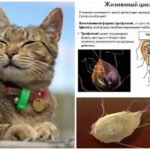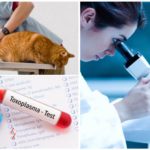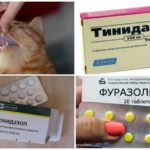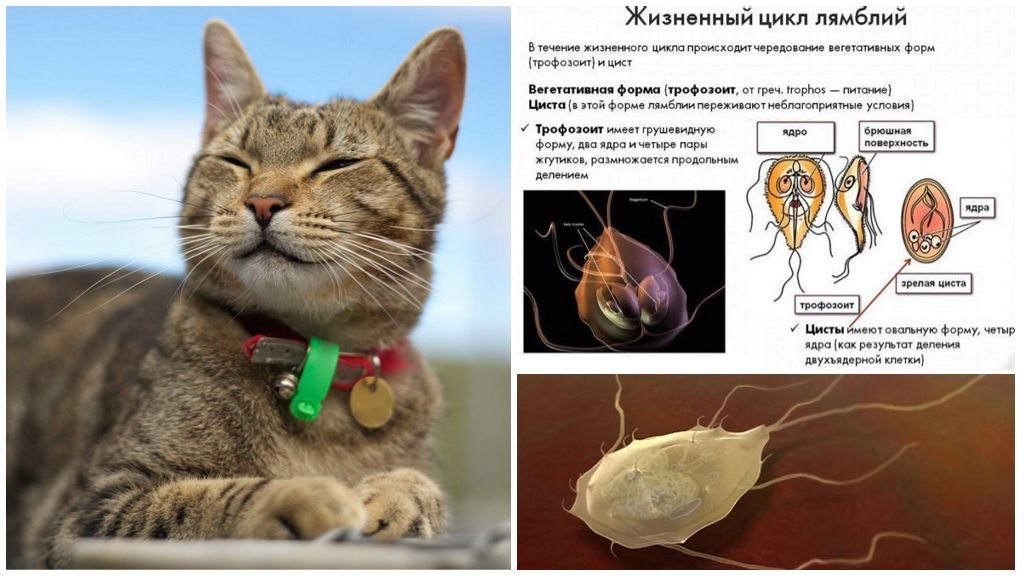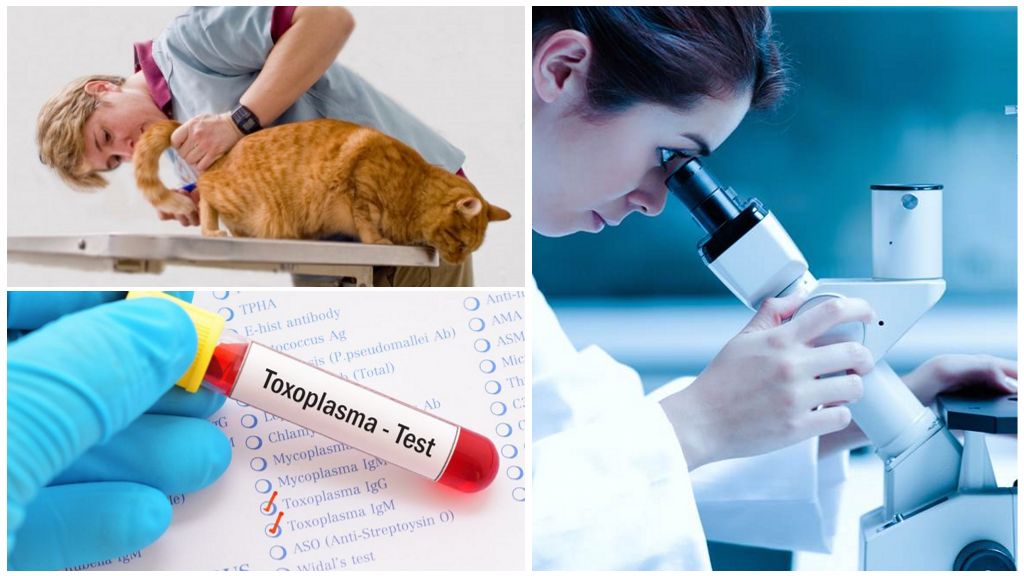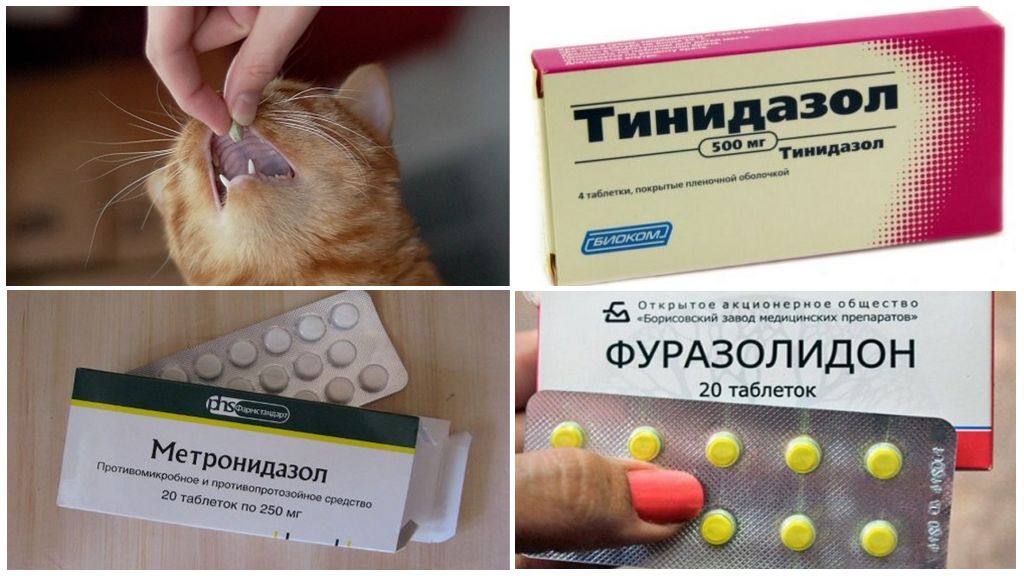Symptoms and treatment of Giardia in cats
Content
- Giardia in cats
- Tests for giardiasis
- Tablets for giardiasis
If it was noticed that the cat began to feel uncomfortable, losing weight, she was tormented by intestinal disorders and diarrhea, that is, an urgent reason to contact a veterinarian. The cause of the disease can be Giardia in cats. These are microscopic specimens affecting not only the intestines of animals, but also their owners - people.Giardia, unlike various types of worms, cannot be identified without special laboratory equipment and analyzes.
Ways of giardiasis and preventive measures
Giardias penetrate into the body of cats in the form of an inactive form of parasites, called cysts. When cysts enter the intestine, the aggressive environment destroys their outer shell. This allows Giardia in cats and cats to move from the form of cysts in the active phase of development in the form of trophozoites. In this form of lamblia development in animals in the intestines begin to feed and multiply, causing harm to the body by the products of its vital activity.
Direct contact of a person with an infected cat or cat, with the observance of hygiene measures, is not an obligatory reason for infection with giardiasis. There are several ways to get lamblia cysts in the body of pets:
- drinking dirty stale water;
- repeated use of the toilet tray;
- licking wool and paws;
- eating cysts with food;
- use of dirty dishes for feeding.
As much as possible to reduce the risk of infection with Giardia for a pet can its owner. To do this, it must ensure timely cleaning, washing and processing of the toilet tray, always clean dishes for food and water.In addition, it is necessary to frequently change, dry and wash the litter of cats, comb and remove wool. When walking on the street, it is necessary to ensure that the animal does not quench its thirst with dirty water and does not pick up food from the ground.
On a note!
If infection with Giardia still happened, then after a while the parasites in the intestines of a cat or cats will begin to actively reproduce. The brightness of clinical manifestations of giardiasis depends on the stage of development of the disease.
Symptoms of Giardia Infection
The more time has passed after infection with Giardia, the more the symptoms of the disease appear. Parasitization of harmful microorganisms and their unlimited reproduction leads to dysfunction of the intestines and the general poisoning of the body by the products of parasites. It is necessary to monitor the appearance, health and behavior of a pet.
The following symptoms will be a sign of infection with giardiasis:
- lethargy and weakness of the cat;
- dry skin;
- dull and brittle wool;
- intestinal disorders, diarrhea;
- the stool changes its consistency from soft to watery;
- the color of the stool changes to yellow or green;
- there is a peculiar smell in feces;
- with feces some blood and mucus is released.
With large colonies, breeding lamblia and severe internal intoxication, cats and cats may vomit, develop an allergic reaction. It is necessary to regularly monitor the health of your pet.
Important!
Checking cats for Giardia is necessary if the animal has decreased activity, stopped playing, loses weight with high appetite, has a stale, sick appearance, suffers from periodic intestinal disorders.
For the prevention of giardiasis testing can be carried out 1-2 times a year. This procedure is especially important for cats that have access to the street and contacts with domestic animals. The degree and speed of development of giardiasis in cats will largely depend on the age of the animal, its weight, and its state of health.
The danger of giardiasis is that it is impossible to determine in time a pet infection. Symptoms of the disease appear stronger with the development of invasion.
Diagnosis and treatment of giardiasis
Guaranteed to confirm the infection and start treating the cat for Giardia in a timely manner is possible only when conducting clinical studies in a veterinary clinic. Independently identify giardiasis is impossible.
The simplest and most common method of diagnosis is the analysis of cat feces. Since the isolation of lamblia in the form of cysts or trophozoites does not occur daily, to obtain reliable data, the study is repeated several times with a break of three or five days.
On a note!
If necessary, you can make a comprehensive study, including enzyme immunoassay or immunochromatographic test. The use of special tests will allow you to more accurately and quickly establish the diagnosis of an affected cat. Additionally, there is such a diagnostic method as a polymer chain reaction, which gives the most accurate result of the study.
After confirming the disease with a clinical study, a specialist will advise on the management of symptoms and treatment of Giardia in cats.
Typical regimens for giardiasis
To rid cats from Giardia, you must use special preparations. The use of anthelmintics does not give the desired effect, and the reproduction of parasites will continue.
Important!
Giardia are not worms, but protozoa and they need to be treated with specific means.
The scheme is compiled using drugs such as:
- Metronidazole;
- Tinidazole;
- Furazolidone;
- Nufuratel;
- Albendazole.
Apply these drugs individually or combined with each other. Most drugs dosage and treatment instructions are written only for people. Therefore, the use of such funds for the treatment of giardiasis in cats alone is not recommended. The optimal treatment regimen and the dose of necessary drugs will be best determined by a veterinarian.
In addition to the above drugs, enterosorbents, probiotics and vitamins can be prescribed. Enterosorbents free the cat's body of toxins, and probiotics will help restore the intestinal microflora. It is very important for an animal with giardiasis to follow a diet during treatment.
The course of treatment for Giardia in a cat lasts 10 or 15 days. After its completion, it is necessary to repeat a set of special tests to confirm the complete recovery of the animal. Giardia in cats have a high resistance to antiparasitic drugs and are harder to kill than dogs. Therefore, if a positive result is not achieved the first time,the course of drug treatment of giardiasis must be repeated.
Increased danger is caused by Giardia in a pregnant cat. Toxic secretions from the life of parasites harm the fetus, especially in the last third of pregnancy. Therefore, it is better to secure the animal in advance and carry out a preventive course of treatment before the planned pregnancy.
Important!
Self-treatment of giardiasis in cats can worsen their health and cause the death of an animal or fetus from an overdose of drugs.
Danger of disease for animals and humans
Colonies lamblia, settled in the intestines of animals, are attached to the walls and violate the layer of epithelium. This causes a violation of intestinal motility, the work of its secretory and suction functions. As a result of a lack of fat, vitamins, carbohydrates and other nutrients, cats become lethargic, drowsy, lose weight and gloss.
Their immunity decreases, the appearance and quality of skin and wool deteriorates, intestinal disturbances become more frequent, and beriberi is manifested. The ingestion of a large number of waste products of parasites can cause toxicological and allergic disorders.Many lamblia in the intestine cause mechanical damage, inflammation and the appearance of erosions.
All this leads to:
- the development of persistent diarrhea;
- disruption of the pancreas;
- dysbacteriosis;
- pancreatitis;
- exhaustion.
In the absence of timely treatment of giardiasis, the cat has a frozen, sickly appearance and may eventually die.
Important!
Giardia is transmitted to humans from cats very rarely and only if non-compliance with precautions and hygiene. People predominantly parasitize another kind of protozoa. Therefore, to the question of whether it is possible to get Giardia from a cat, parasitologists often respond in the negative. But in order to prevent the need to be sure to wash your hands with soapy water after contact with animals and cleaning the toilet tray. After all, cats are carriers of other infections.
Do not allow animals to jump on the dining table and sleep on the family bed. Wool after combing is better to burn. Cups for cat food and drink should be treated from time to time with boiling water.

